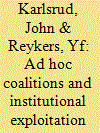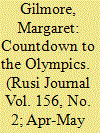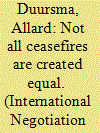| Srl | Item |
| 1 |
ID:
174551


|
|
|
|
|
| Summary/Abstract |
While the increasingly thick web of global, regional and sub-regional security arrangements and institutions has received ample scholarly attention, the phenomenon of ad hoc military coalitions and how they impact these institutions has been relatively little explored. We examine ad hoc coalitions in international security responses and develop a tentative typology of military responses that takes ad hoc coalitions into consideration, where we differentiate in terms of institutionalisation and duration. Following a rational-choice institutionalist logic, we argue that institutional proliferation increases the chances of institutional exploitation. We illustrate this with how states apply a pick-and-choose approach in which institutional products but not frameworks are used. They use the interoperable forces, a common culture and mainstreamed doctrine, but not the formal deployment of rapid response mechanisms of eg the North Atlantic Treaty Organization and the African Union. In closing, we observe that institutional proliferation in international security facilitates a functionalist approach mainly inspired by national self-interest. Future research should examine whether this could result in dwindling relevance of international institutions, first in the domain of security, but later also in other domains.
|
|
|
|
|
|
|
|
|
|
|
|
|
|
|
|
| 2 |
ID:
104761


|
|
|
|
|
| Publication |
2011.
|
| Summary/Abstract |
In one sense, the London Olympic Games are already under attack: dozens of suspected fraudsters were arrested as tickets went on sale on 15 March 2011. But there are other major risks identified, including terrorism. Now, as construction of the venues nears completion and security plans move towards the operational stage, Margaret Gilmore interviews the key players in the efforts to secure the event, and assesses the risks to the Games and the security arrangements being put in place to counter them.
|
|
|
|
|
|
|
|
|
|
|
|
|
|
|
|
| 3 |
ID:
180891


|
|
|
|
|
| Summary/Abstract |
Past research has found that third party pressure makes the signing of a ceasefire more likely, but also more likely to break down. What explains this variation? I argue that third party pressure is more likely to lead to a durable ceasefire if pressure is applied to persuade the conflict parties to continue to negotiate and produce a detailed ceasefire document, whereas pressure solely aimed at making the conflict parties sign a ceasefire document undermines the durability of the ceasefire. A comparison of four ceasefires concluded in Sudan supports this argument. Third party pressure that led to the Nuba Mountains Ceasefire and the Agreement on Security Arrangements helped move the negotiations on security arrangements forward. By contrast, the N’Djamena Ceasefire Agreement and the Darfur Peace Agreement were imposed on the parties without regard for political and technical aspects of the ceasefire. This explains why violence soon resumed.
|
|
|
|
|
|
|
|
|
|
|
|
|
|
|
|